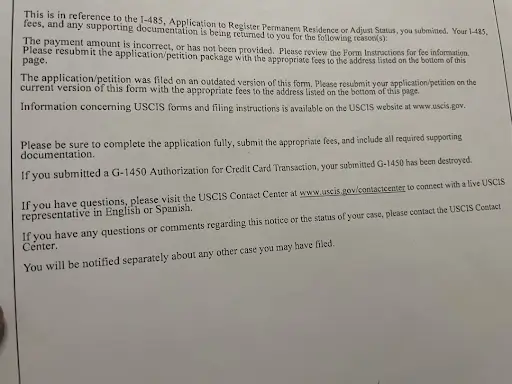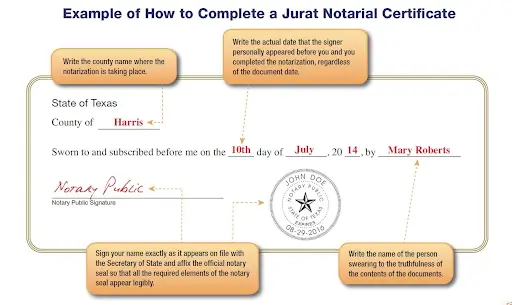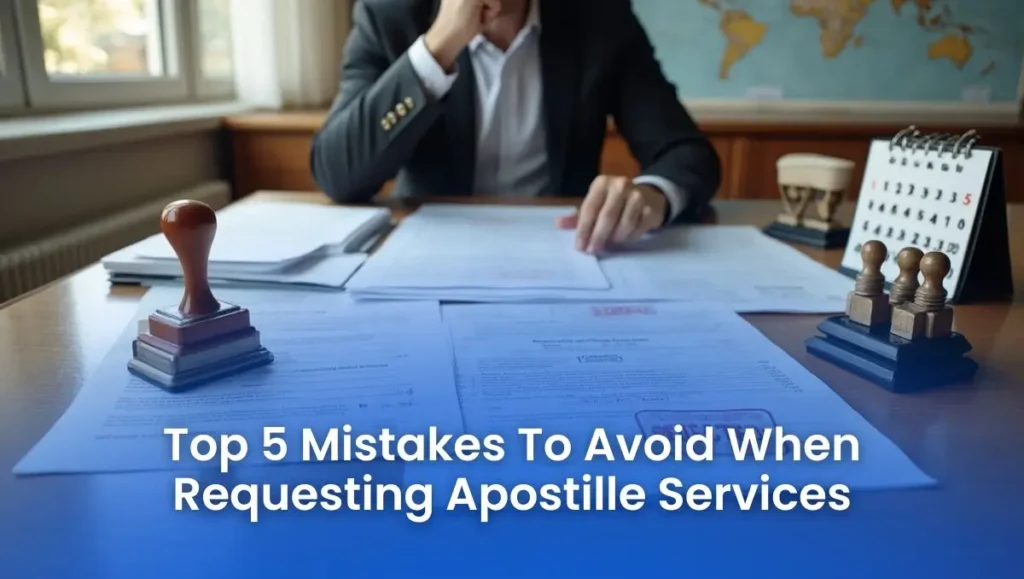Simple mistakes with apostille services can turn a basic document authentication into a bureaucratic nightmare. An apostille is a special certificate that a competent authority issues to confirm a document’s authenticity. Over the last several years, we’ve seen how small errors lead to most important delays, rejections, and extra costs.
People often struggle with apostille services because they don’t grasp the requirements or miss crucial steps. Your apostille might take longer than expected due to mistakes you could easily avoid. The process becomes especially challenging for newcomers. These delays can affect everything from your overseas job applications to international business transactions.
This piece walks you through five common mistakes people make when they ask for apostille services. You’ll also find practical ways to avoid these issues. The information will save you time, money, and stress – whether you’re new to the process or have faced rejections before. Understanding these errors helps you navigate the system better. For expert assistance, visit Oregon Apostille Hub.
Submitting the Wrong or Ineligible Document

People often hit their first roadblock with apostille services right at the start. They submit documents that don’t qualify for authentication. This basic mistake leads to automatic rejection, lost fees, and delays. You need to know which documents qualify for apostille certification and how to submit them to get your application approved.
Original vs. photocopy: What’s accepted
People make mistakes with apostille services by submitting the wrong version of their document. You can only get an apostille on two types of documents:
- Original documents with original signatures, seals, and dates of issuance
- Properly certified or notarized copies of original documents (where allowed)
Your application will get rejected if you submit a regular photocopy. One expert puts it this way: “Not just any random copy you made at the local Xerox shop” will work. Documents with photocopied signatures won’t get certified either.
A certified copy has an official statement that proves it matches the original document. Only authorized people, like notaries public or government officials, can make this certification.
Many countries accept properly notarized copies for apostille, even though originals work better. This helps when you need to keep your originals safe or use them somewhere else.
State-specific document rules
Each state has its own rules about apostille services. These rules affect which documents qualify and how you need to prepare them.
Texas splits documents into two main groups:
- Recordable documents – State or county officials issue these (like marriage licenses, divorce decrees, and birth certificates). Notaries can’t certify these copies, and the documents must be less than five years old.
- Non-recordable documents – These aren’t recorded with state or county officials (like affidavits, copies of licenses, and business documents). A Texas Notary Public can notarize these..
Common document types that get rejected
Some documents get rejected more often than others, even when people prepare them carefully. Knowing these common issues saves time and frustration.
Documents for non-Hague Convention countries also face rejection. Countries like Canada and the UAE don’t use apostilles. They need consular legalization instead. Check your destination country’s requirements before starting.
Documents with wrong notarization often get rejected. Using an unauthorized notary or getting it notarized in the wrong place will likely cause problems. Make sure your notary has the right license and authority.
Other documents that often get rejected include:
- Online records checks from the internet or FBI
- Old documents that don’t meet current standards
- Damaged documents that you can’t read clearly
- Documents with terms like “Notario Publico” or extra statements from notaries who overstepped their authority
Improper or Missing Notarization

Notarization errors are the biggest problem in the apostille process. You might have perfectly eligible documents, but incorrect notarization can make your submission invalid. You need to know the right way to notarize documents—and when not to—to get successful apostille applications.
When notarization is required
Notarization confirms many documents before they get apostille certification. Many people get confused about which documents need notarization, which causes rejections and delays.
Documents fall into two main categories for notarization requirements:
Documents that typically require notarization:
- Personal affidavits and statements
- Powers of attorney
- Business documents like articles of incorporation and bylaws
- Agreements and contracts between private parties
- Deeds of assignment
- Home studies and income verification documents
These documents come from private individuals or entities rather than government authorities. They need notarization to confirm their authenticity before getting an apostille. Without proper notarization, these documents will face rejection.
Documents that typically don’t require notarization:
- Birth certificates and other vital records
- Government-issued certifications
- Court judgments and decrees
- Documents signed by federal officials
- Documents signed by U.S. consular officers
- Documents signed by military notaries or judge advocates
- Documents signed by foreign consuls registered with the U.S. Department of State
What makes a notarization valid
After you know a document needs notarization, you must ensure the notarization meets all requirements. Invalid notarizations cause unnecessary delays and frustrations.
Notarial standards say the notary acts “as an impartial third-party witness to not only the signature of a document but also that all parties who signed a document did so willingly and under their own free will”.
The notary’s official seal or stamp, commission expiration date, and notarization date must be included. These elements must be clear and properly placed on the document.
Any notarial errors may result in enforcement action.
Most common notarization mistakes:
- Missing notary seal or stamp
- Expired notary commission
- Document signed before meeting with the notary
- Notary failing to complete all certificate information
- Improper or missing date on notarization
- Notary acting beyond their authority or jurisdiction
Apostille authorities look at notarizations with great detail. Even small notarial errors that might work in regular business can cause apostille rejection.
[Continued in the next part due to length…]
Sending Documents to the Wrong Authority
The most frustrating mistake in apostille services happens when well-prepared documents get rejected because they went to the wrong government office. This error seems easy to avoid. Yet many applicants get confused about where to send their paperwork due to complex state and federal jurisdictions.
State vs. federal apostille services
The U.S. apostille process works through a dual system that splits duties between state and federal authorities. Learning this difference helps ensure successful document authentication.
State-level apostilles come from each state’s designated authority—usually the Secretary of State or Department of State. These offices handle documents from within that state, including:
- Vital records (birth certificates, death certificates, marriage certificates)
- Notarized documents and affidavits
- State court documents and judgments
- Academic records from state-recognized institutions
- Legal documents like power of attorney forms
Federal-level apostilles come only from the U.S. Department of State’s Office of Authentications. This federal office handles documents from U.S. federal agencies, such as:
- FBI background checks
- Documents from federal courts
- Patents and trademarks
- Documents signed by federal officials
- Certificates of naturalization
Documents must get authentication from the same level of government that issued them. State officials cannot authenticate federal documents, and federal officials cannot authenticate state documents.
New applicants often send state-issued documents to federal offices or vice versa. Government sources make it clear – state offices cannot authenticate “Documents signed by an out-of-state notary, documents issued by the federal government, out-of-state vital records or court documents, and out-of-state school transcripts”. These documents need proper submission to the right issuing authority.
How to identify the correct office
Finding the right authority for your document needs a step-by-step approach based on document origin and destination country.
Step 1: Identify your document’s issuing authority. Ask yourself: Who issued your document? State-issued documents (like Texas birth certificates) need state-level authentication. Federal documents (like FBI background checks) need federal authentication.
Step 2: Check if your destination country is part of the Hague Convention. This step matters greatly. The U.S. Department of State says documents going to Hague Convention Treaty countries need certification from their issuing state. Non-Hague countries follow different rules.
Hague Convention member countries:
- State documents need apostilles from that state’s authority
- Federal documents need apostilles from the U.S. Department of State
Non-Hague countries:
- Documents need authentication certificates instead of apostilles
- Different legalization rules often apply
Birth certificates from U.S. states but needed in non-Hague countries often confuse. Official guidance states that countries not on the 1961 Hague Convention member list require authentication certificates.
Step 3: Submit to the correct office. After identifying document type and destination needs, send your application to the right place:
- State documents go to your state’s Secretary of State or equivalent office
- Federal documents go to the U.S. Department of State’s Office of Authentications
Some documents have special rules. Out-of-state vital records or court documents must go to the issuing state, not your current state.
Consequences of misdirected submissions
Sending documents to the wrong authority creates many problems beyond rejection. These mistakes can affect international plans severely.
Automatic rejection and resubmission requirements. Wrong authorities return documents without processing. This means starting over with the right office, which doubles your timeline. Apostille services warn that wrong submissions lead to major delays.
Ignoring Country-Specific Apostille Requirements
Your apostille request might get rejected even with flawless documentation and proper government office submission if you overlook country-specific requirements. This mistake affects thousands of applications each year. The rules that govern document authentication change significantly based on where you plan to use your paperwork.
Hague vs. non-Hague countries
The main thing you need to know about international document authentication boils down to whether your destination country takes part in the Hague Apostille Convention. The treaty now has 126 member states worldwide. This creates two separate paths to get your documents authenticated.
For Hague Convention countries:
- You just need one apostille certificate from the right authority
- No extra embassy certification needed
- Your documents work in all member nations
For non-Hague Convention countries:
- You need more than just an apostille
- You must get embassy or consular legalization
- Several certifications are usually needed
Many people make mistakes because they don’t understand this difference. They try to get apostilles to countries like Canada, China, or the UAE, and their paperwork gets rejected when they arrive.
Some non-Hague countries want authentication certificates instead of apostilles.
Embassy legalization vs. apostille
Documents going to non-Hague countries need embassy legalization. This works nothing like apostille certification.
An apostille takes one step, but embassy legalization needs several stages:
- Notarization (for private documents)
- Authentication by the Secretary of State
- Certification by the U.S. Department of State (for U.S. documents)
- Final legalization by the destination country’s consulate
The UK shows this well: “Documents would also require legalization from the respective embassy. For example, a United Kingdom birth certificate intended for use in the Emirates would need to be legalized via the apostille and also stamped by the embassy”.
Underestimating Time and Choosing the Wrong Service
Many people still face delays with their apostille applications even after they dodge all the pitfalls we talked about earlier. The last mistake people make comes down to poor planning of timing and service choices.
Why is my apostille taking so long?
Your apostille timeline can change a lot based on your document type and how you submit it. Federal apostilles from the U.S. Department of State now take 8-12 weeks to process—much longer than their old 4-6 business day timeline. State-level processing usually takes 2-10 business days under normal conditions.
Here’s what affects these timelines:
- How complex your documents are and what needs to be verified
- The number of requests offices are handling
- Whether you mail it in or show up in person
- Extra certifications you might need
The U.S. Department of State makes this point clear: “Think about your travel date and our processing times when requesting services”.
Peak seasons and processing delays
Some times of year always bring longer wait times. The experts say these busy seasons include:
- Summer (June through September)
- Major holidays (November through January)
- Year’s end
- When school years finish
What normally takes days might stretch into weeks during these busy times. The DC Office of the Secretary says delays can reach “5 to 6 weeks” in peak season. On top of that, things like staff shortages can make wait times even longer.
Risks of using unreliable apostille services
Going with an unreliable apostille service provider can cause real problems. Here’s what could go wrong:
- Your documents might come back wrong or get rejected
- You could face legal issues internationally
- You might get stuck overseas with invalid papers
- You’ll have to pay extra to fix mistakes
- You could miss important deadlines
To find a service you can trust, look at their credentials, how long they’ve been around, and what customers say about them. Watch out for promises that sound too good. If someone claims they can speed things up way faster than normal, that’s usually a red flag.
Conclusion
Success with the apostille process comes down to paying attention to details and knowing exactly what’s required. In this piece, we’ve looked at five major mistakes that can hold up your apostille application. The process might look simple at first, but each step has its challenges that need careful thought.
Getting the right type of document is the foundation of success. You must have original documents or certified copies that match specific criteria based on the document type and who issued it. On top of that, handling notarization correctly can make or break your application. Knowing exactly when you need notarization and when to skip it can save you weeks of waiting.
Sending your documents to the right authority makes all the difference. Many people get confused between state and federal jurisdictions, but getting it right the first time prevents automatic rejection. Your destination country’s requirements play a vital role in deciding between an apostille or consular legalization.
Setting realistic timelines and working with reliable service providers will affect your experience a lot. Processing times can stretch from days to weeks during busy seasons, so proper planning helps meet international deadlines. For professional guidance, check out Oregon Apostille Hub.
Start your apostille process today — contact us now or request a quote online!
FAQs
Q1. What documents typically require notarization before apostille?
Personal affidavits, powers of attorney, business documents like articles of incorporation, and private agreements usually require notarization before apostille. Government-issued documents like birth certificates and court judgments generally do not need notarization.
Q2. How do I know if I need an apostille or embassy legalization?
If your document is destined for a country that is part of the Hague Apostille Convention, you’ll need an apostille. For non-Hague countries, you’ll likely need embassy legalization, which involves additional steps beyond the apostille process.
Q3. Why might my apostille request be taking longer than expected?
Processing times can vary greatly depending on factors like document type, submission method, and current request volume. Peak seasons (summer months, major holidays) often see longer processing times. Federal apostilles typically take 8-12 weeks, while state-level processing ranges from 2-10 business days under normal circumstances.
Q4. What’s the difference between state and federal apostille services?
State-level apostilles are issued for documents originating within that state, such as vital records and notarized documents. Federal apostilles, issued by the U.S. Department of State, are for federal documents like FBI background checks and federal court documents.
Q5. How can I avoid common mistakes when requesting apostille services?
To avoid mistakes, ensure you’re submitting the correct document type, handle notarization properly, send documents to the right authority, understand country-specific requirements, and plan realistically for processing times. Consider using a reputable apostille service provider if you’re unsure about the process.

